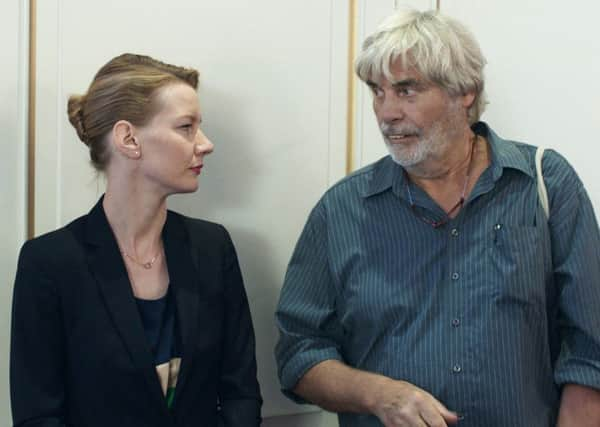Film reviews: Toni Erdmann | Loving | Gold


Toni Erdmann (15) ****
Loving (12A) ***
Gold (15) **
If you’ve heard anything about Toni Erdmann, one of the most revered movies to appear on the festival circuit last year and now an Oscar nominee for best foreign language film, it’s probably this: that it’s a three-hour German comedy about a practical joke-loving father’s relationship with his uptight, corporate, go-getting daughter. As incongruous as those basic details sound, it’s all those things and more; but it’s precisely the film’s incongruity – and its unexpected narrative shifts and defiant rule-breaking at a time when arthouse cinema is increasingly formulaic – that makes it so rich, funny, rewarding and ultimately moving.
Writer/director Maren Ade’s approach quietly subverts expectations almost from the off. Combining farce with meticulously observed moments of social awkwardness, weirdness and bristling conflict between the film’s main characters – 40-year-old Ines (Sandra Hüller) and her father Winfried (Peter Simonischek) - the film gets at truths about the complex relationships that exist between parents and their grown-up children, especially when those children no longer appear to have any need for the people who raised them. In the process the film also skewers the absurdities of the modern world and the banalities of an all-encompassing corporate culture that can’t help but inspire strange behaviour regardless of how much one tries to fit in.
Advertisement
Hide AdTaking its title from the alter ego Winfried adopts to embarrass Ines as she tries to close a business deal in Bucharest (where she’s been posted for a year, paying her dues in the hopes of a promotion she seems to know is never going to happen), the film is so sly about introducing Toni that his behaviour can appear somewhat inscrutable. Wearing false teeth and a shaggy black wig, he inveigles his way in to Ines’s inner circle by presenting himself as a life coach and, at one point, the German ambassador to Romania. Is he on a deranged mission to save his daughter’s soul or has the recent death of his beloved dog unmoored him emotionally?
It’s a little of both, but as he starts hanging around Ines’s office, her apartment, her after-hours drinking haunts, the film – and Simonischek – let us see Winfried’s heart breaking through all the tomfoolery as he analyses what he perceives to be the empty life his only daughter is living. Ines, however, is no stereotype. She may be wound a little tight – a consequence of a stressful job that has real life consequences for many people (unlike her father’s rather nice career as a music teacher) – but in her own ways she’s as odd as her father and her own efforts at straight-laced rebellion against his jokey lifestyle choices manifest themselves in bizarre ways involving French fancies, karaoke versions of Whitney Houston
songs and naked team-building exercises.
Though some of this can’t help but flirt with cliché, the film is so finely constructed it never gives in to this impulse. Ade gives her actors space to breathe, to be human; she extends scenes beyond what might seem like their natural end-point in order to imbue them with a melancholic edge that feels truer to the way life functions. This is the sort of film that can follow a whoopee cushion with a tear and make a cheese grater feel as significant as a death in the family, It’s also the sort of movie that understands that while humour can be found in the smallest of moments, those moments are ephemeral and require more effort to remember and appreciate than people always have time to give them. Nevertheless, as Toni in his comedy gnashers makes clear: it’s important to try.
As a filmmaker Jeff Nichols (Take Shelter, Midnight Special) has spent his career making Southern gothic stories with a mythological or supernatural edge. In Loving, however, he confronts the historical injustices of the South head-on with a dramatisation of the abhorrent case against Richard and Mildred Loving, a mixed-race couple living in Virginia in the 1950s who were forced to leave the state upon threat of imprisonment after illegally marrying each other. Respectively played by Joel Edgerton and Ruth Negga, the Lovings’ ordeal played out against the backdrop of the swelling civil rights movement, but Nichols smartly zeroes in on the couple themselves to show the toll taken on ordinary people when the forces of history conspire against them for being true to their feelings. Stripped of any melodrama, the film does a good job of laying out the particulars of the case and the significance it had in terms of challenging the US constitutional ban on interracial marriage. But there’s no denying it’s a film built around the performances and here both Edgerton (subdued, monosyllabic) and Negga (who picked up an Oscar nomination for the film) excel without the need for grandstanding speeches or false heroics.
Great actors frequently work from their gut, but in Gold we get the rare sight of Matthew McConaughey leading with his. The normally svelte actor certainly lets it all hang out as a down-on-his-luck gold prospector who strikes it rich in Indonesia after teaming up with a discredited geologist (Edgar Ramirez). Bald-headed and pot-bellied, he’s embraced his character’s good-ol’-boy-gone-to-seed demeanour. Unfortunately, as directed by Syriana’s Stephen Gaghan, this ficitonalised take on a real-life 1990s gold-mining scandal is too in thrall to The Wolf of Wall Street for its faux cautionary rise-and-fall plotting to be anything more than another male-centric celebration of bad behaviour, usually at everyone else’s expense. It’s mildly diverting, but nothing more. ■